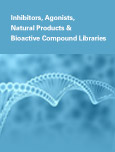Request The Product List ofAngiopoietin Receptor
Angiopoietin Receptor
Angiopoietin receptors are receptors that bind angiopoietin, they are receptor tyrosine kinases (RTKs). TIE-1 and TIE-2 (TEK kinase) comprise the cell-surface receptors that bind and are activated by the angiopoietins, (Ang1, Ang2, Ang3, Ang4). The angiopoietins are protein growth factors that regulate angiogenesis, the formation of blood vessels.
The angiopoietin/tunica interna endothelial cell kinase (TIE) signaling axis have become additional targets for therapeutic intervention for angiogenic pathways in cancer cells. BAY-826 inhibits TIE-2 phosphorylation in vitro and in vivo as demonstrated by suppression of Angiopoietin-1- or Na3 VO4 -induced TIE-2 phosphorylation in glioma cells or extracts of lungs from BAY-826-treated mice. Pexmetinib (ARRY-614), an inhibitor of the angiopoietin-1 receptor Tie-2, inhibited the proinflammatory kinase p38 MAPK (which is overactivated in MDS). Pexmetinib inhibited leukemic proliferation, prevented activation of downstream effector kinases, and abrogated the effects of TNFα on healthy hematopoietic stem cells.
Selective small molecule inhibitors of Tie-2 kinase are important tools for the validation of Tie-2 signaling in pathological angiogenesis.
References:
1. Hu B, et al. Curr Oncol Rep. 2009 Mar;11(2):111-6.
2. Lin P, et al. J Clin Invest. 1997 Oct 15;100(8):2072-8.
3. Shepherd FA. Lung Cancer. 2001 Dec;34 Suppl 3:S81-9.
4. Cee VJ, et al. Bioorg Med Chem Lett. 2009 Jan 15;19(2):424-7.
5. Bachegowda L, et al. Cancer Res. 2016 Aug 15;76(16):4841-4849.













